Children & young people newsletter
Published: 23 Jun 2022
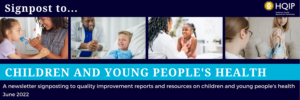
“Children and young people represent a third of our country. Their health and wellbeing will determine our future. Recent years have seen improvements…but a mixed picture overall. Now we need to build on that and broaden our focus.”
NHS Long Term Plan, A strong start in life for children and young people (Chapter 3)
Welcome to our second themed update, following on from the first edition on Maternity and Newborn care in March. In light of the release of two new reports on diabetes in adolescents and young adults and on asthma in children, as well as to mark National Children’s Day in the UK last month, we have decided to focus on children and young people (C&YP) in this edition. In addition to the latest reports from relevant audits, this update brings together key information from both HQIP and the sector – and so is a useful summary for anyone working in this field.
| Please share: Help to update your colleagues by forwarding to anyone working in this field (if you receive this update and you are not on HQIP’s mailing list, you can subscribe to future updates here). You can also stay up-to-date by following us on twitter: @HQIP. |
Contents
- NEW from HQIP: Latest reports (Diabetes, Asthma, and Maternity/Perinatal); Coming in 2022
- Look again: Recent reports; Spotlight on the Early Years report
- Benchmarking: National Clinical Audit Benchmarking (NCAB); Model Health System
- Engaging with patients: Paediatric intensive care; Asthma and COPD; Diabetes; Neonatal care; Epilepsy; Maternity and perinatal
- Sector round-up: Reports; Resources and updates
- Long read (blog): Is it possible to ‘have it all’?
- And finally: Clinical Audit Awareness Week; Further resources from HQIP
NEW from HQIP
National Diabetes Audit (NDA): Adolescent and Young Adult Type 1 Diabetes report
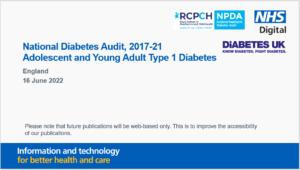 This latest report from the NDA published on 16 June 2022, which covers the period 1 January 2017 to 31 March 2021, is based on data from people with type 1 diabetes aged between 15 and 25 years old in England (with limited data from Wales) and focuses on care during the period when young people with diabetes move from paediatric to adult based clinical care. It found that there were more males than females (55.2% vs 44.8%) with type 1 diabetes, and more people than expected lived in areas of social deprivation. Other key findings include:
This latest report from the NDA published on 16 June 2022, which covers the period 1 January 2017 to 31 March 2021, is based on data from people with type 1 diabetes aged between 15 and 25 years old in England (with limited data from Wales) and focuses on care during the period when young people with diabetes move from paediatric to adult based clinical care. It found that there were more males than females (55.2% vs 44.8%) with type 1 diabetes, and more people than expected lived in areas of social deprivation. Other key findings include:
- For 15 to 20 year-olds, the mean/median HbA1c was similar at all ages of leaving paediatric services.
- Diabetic ketoacidosis (DKA) frequency (single and multiple inpatient admissions with episode of DKA) started to rise at 16 years old, peaked at 18 years old and then fell slowly but progressively.
- 81.9% of adolescents using insulin pumps continue to do so in young adulthood. However, insulin pump usage rates dropped by almost two thirds (33.3% to 12.1%) between the ages of 15 and 25 years.
READ IN FULL: The full report, with all key findings and recommendations, can be found here.
Child and Young Person Asthma 2021 Organisational Audit: Summary report
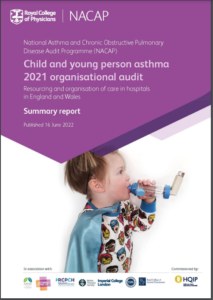 The National Asthma and Chronic Obstructive Pulmonary Disease Audit Programme (NACAP) published its latest report on children’s asthma on 16 June 2022. Based on data collected between 4 October and 5 November 2021, the report presents information on the structure and resourcing of 136 out of 143 (95%) hospital-based services that provide acute asthma care to children and young people (CYP) in England and Wales.
The National Asthma and Chronic Obstructive Pulmonary Disease Audit Programme (NACAP) published its latest report on children’s asthma on 16 June 2022. Based on data collected between 4 October and 5 November 2021, the report presents information on the structure and resourcing of 136 out of 143 (95%) hospital-based services that provide acute asthma care to children and young people (CYP) in England and Wales.
It also measures data against the key performance indicators recommended by NACAP to support good practice in acute asthma care (compared to data from June 2019 to January 2020) finding that, while there may have been an improvement in hospitals offering some aspects of transition for CYP with asthma, the overall quality of transition is still suboptimal. Other findings include:
- There has been a significant improvement in the provision of spirometry and fractional exhaled nitric oxide (FeNO) diagnostic tools to diagnose asthma, and
- There has been no overall improvement in the provision of respiratory nurse specialists or designation of a named asthma lead.
READ IN FULL: The full report, with all key findings and recommendations, can be found here.
National Maternity and Perinatal Audit (NMPA): Clinical report 2022
In addition, it might be useful to note that the National Maternity and Perinatal Audit (NMPA) published its latest Clinical Report – which is based on births in NHS maternity services in England and Wales between 1 April 2018 and 31 March 2019 – on 16 June 2022.
READ IN FULL: The full report, with all key findings and recommendations, can be found here.
Coming in 2022HQIP is responsible for a number of national healthcare quality improvement programmes, including the National Clinical Audit and Patient Outcomes Programme (NCAPOP) on behalf of NHS England. As such, we manage the publication of reports from over 60 audits and programmes. Find below a summary of the reports that includes information on aspects of children and young people’s health that are due to be available in 2022 (projected publication date in italics*):
STAY UP-TO-DATE: For notifications when these reports become available, sign up to HQIP’s mailing list to receive our monthly eBulletins. *These dates are indicative and subject to change – a full up-to-date publication schedule from HQIP can be found here. |
Look again
Recent reports
HQIP has an unparalleled repository of reports and other resources to support quality improvement and clinical effectiveness in healthcare services. Find below a summary of those relating to children and young people’s health from the last year (with publishing date in italics):
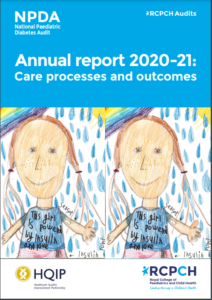 |
National Paediatric Diabetes Audit Annual Report 2020/21 (April 2022). Found an increase of 20.7% in the incidence of Type 1 diabetes in 2020/21 amongst those aged 0-15, compared to 2019/20. |
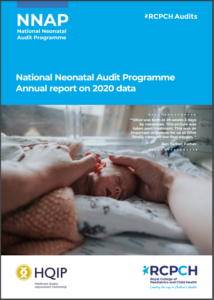 |
National Neonatal Audit Programme (NNAP) Annual Report on 2020 data (March 2022). Describes neonatal care in a period when societal lockdowns, limitations to parental access, staff shortages and general disruption to hospital services had the potential to significantly impact care delivery. |
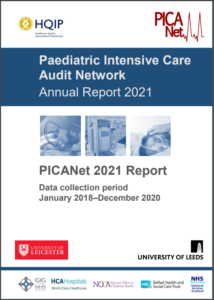 |
Paediatric Intensive Care Audit Network (PICANet) Annual Report 2021 (Jan 2022). Describes paediatric critical care in the United Kingdom (UK) and Republic of Ireland (ROI) between January 2018 and December 2020. |
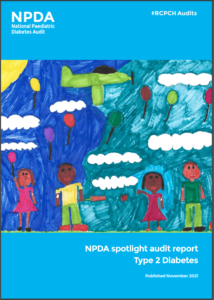 |
National Paediatric Diabetes Audit: Spotlight Report – Type 2 Diabetes (Nov 2021). Based on 810 children and young people up to the age of 24 with Type 2 diabetes, the prevalence of Type 2 diabetes in 2019/20 was found to be 4.5 per 100,000 children and young people up to the age of 15 |
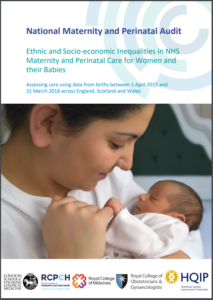 |
National Maternity and Perinatal Audit (NMPA) Inequalities Sprint report (Nov 2021). Investigates ethnic and socio-economic inequalities in maternity and perinatal care for women and babies. |
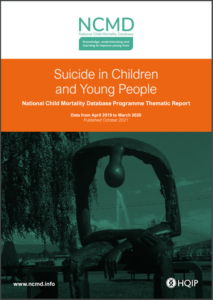 |
National Child Mortality Database (NCMD): Suicide in Children and Young People (Oct 2021). Designed to identify the common characteristics of children and young people who die by suicide, investigate factors associated with these deaths and identify common themes to help inform professionals. |
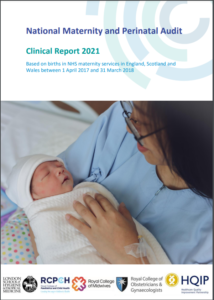 |
National Maternity and Perinatal Audit (NMPA) Clinical report 2021 (Oct 2021). Presents measures of maternity and neonatal care based on 304,518 births between 1 April 2017 and 31 March 2018 in NHS services. |
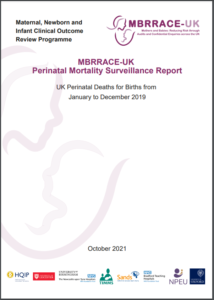 |
Maternal, Newborn, and Infant (MNI) Clinical Outcome Review Programme MBRRACE-UK Perinatal Mortality Surveillance report (Oct 2021). Focuses on the surveillance of perinatal deaths from 22+0 weeks between 1 January 2019 and 31 December 2019. |
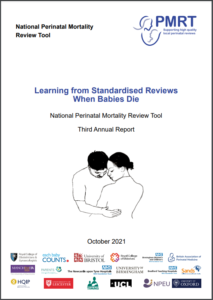 |
Perinatal Mortality Review Tool (PMRT) Learning from Standardised Reviews When Babies Died report and infographic (Oct 2021). Based on reviews carried out from March 2020 to February 2021. |
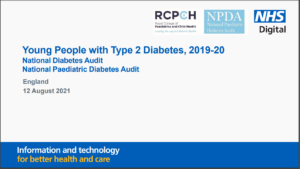 |
Young people with Type 2 Diabetes, 2019-2020 (Aug 2021). Found that, compared with people aged 40 and over, young people with Type 2 diabetes are more likely to be female, of minority ethnicity, living in an area of social deprivation and classified as overweight or obese. |
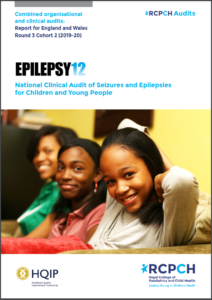 |
National Clinical Audit of Seizures and Epilepsies for Children and Young People (Jul 2021). Presents data and evidence from the three main domains of ‘Epilepsy12’, a clinical audit describing patient care, an organisational audit describing service structures, and related quality improvement activities.
|
FURTHER RESOURCES: More reports, infographics and resources to support quality improvement on a wide range of clinical disciplines can be found on the Resources section of our website.
Spotlight on the Early Years
However, the report also calls for changes to audit reporting such as to moving towards shorter reports, with timely interactive datasets and links to online improvement resources. READ IN FULL: Spotlight on the Early Years can be read in full here. |
Benchmarking

National Clinical Audit Benchmarking (NCAB)
National Clinical Audit Benchmarking (NCAB) is an online portal providing access to national audit performance data benchmarked by speciality, Trust, hospital or unit. Availability depends on each audit or registry’s publishing schedule; find below details of data that is currently published relating to children and young people’s services:
- Maternal, Newborn and Infant Clinical Outcome Review Programme – published January 2022
- National Paediatric Diabetes Audit – published September 2021
- Paediatric Intensive Care Audit – published September 2021
- National Maternity and Perinatal Audit – published September 2020
- National Neonatal Audit Programme – published January 2019.
FIND OUT MORE: To find out about your provider’s benchmarked performance in a range of clinical areas – from maternity and paediatrics through to cancer and diabetes – go the NCAB website.
Model Health SystemFor those with access, audit key metrics on paediatric diabetes from the National Clinical Audit Benchmarking (NCAB) portal are now available in the Model Health System. Data on other clinical practice areas are also available, and more is being published over time. MORE INFORMATION: The Model Health System website can be found here. |
Engaging with patients
Paediatric Intensive Care Audit Network (PICANet)A section of the PICANet website is dedicated to Patient and Family information, which aims to help parents, carers and families in relation to paediatric intensive care services. To view online, go to: www.picanet.org.uk/patients-and-families-information They have also published a book aimed at families and friends about Paediatric and Neonatal Intensive Care Units which, while published in 2014, is nonetheless a useful example of an innovative approach to communication. To view online, go to: www.picanet.org.uk/wp-content/uploads/sites/25/2018/02/PICU_Story_PICANet_Families-Group_2014_v2.2.pdf |
At HQIP we are proud to say that involving patients and carers is at the heart of everything we do. Part of this endeavour is the Richard Driscoll Memorial Award (RDMA), which celebrates best practice in meaningful public and patient involvement within HQIP commissioned programmes. Find below resources relating to children and young people from recent years:
National Asthma and COPD audit programme (NACAP)
This RDMA 2021 winner highlights work to involve people of all ages in the audit, as well as collaboration with charities and CYP networks. NACAP also proactively visited clinics to talk to parents/carers and children in real time about their care. More information can be found using the following links:
National Paediatric Diabetes Audit (NPDA)
The RDMA 2020 highly commended entry from the NPDA is for the audit’s parent and carer communication strategy which was co-produced with families, which included an animation and summary booklets with information about key health checks that children with diabetes should be receiving. More information can be found using the following links:
National Neonatal Audit Programme (NNAP)
The NNAP team works closely with their parent representatives, and this blog highlights the benefits of working practices during lockdown and how the audit improved accessibility for interested parents to be involved – with examples of outputs and impact throughout the pandemic.
BLOG: You can find out more about NNAP work to engage patients on the HQIP website.
Epilepsy12 (RCPCH)
The RCPCH was announced as the first ever RDMA winner for outstanding engagement with C&YP in the Epilepsy 12 national clinical audit. Through collaboration with patients and carers, they developed a PREM questionnaire to ensure the perspectives of young people are captured in the audit. More information can be found using the following links:
Maternity and perinatal exemplars
In addition, it might be useful to note the following case studies from the National Maternity and Perinatal Audit (NMPA):
Sector round-up
Find below a short overview of some of the key reports and resources on children and young people’s health from the wider healthcare sector. We recognise that many have been published for some time and are well-known (and well used), but they have been included here nonetheless as they remain useful to anyone working in this field…
Reports
The best start for life; a vision for the 1001 critical daysPublished in March 2021 by the Department for Health & Social Care (DHSC), this key report sets out how a “strong, supportive policy framework” can make a critical difference in the first 1001 days of a child’s life, and go on to have long-lasting positive impact thereafter. |
Other useful reports include:
- State of Child Health in the UK (RCPCH). A landmark report from 2020 on the health and wellbeing of children and young people that looks at the evidence on child health outcomes and data trends across the UK.
- Best beginnings in the early years (former Children’s Commissioner, Anne Longfield). Report that focuses on the a broad consensus that, to genuinely improve children’s long-term life chances, we need to start younger.
- National Child Measurement Programme, England 2020/21 (NHS Digital). Finds that Obesity rates in both reception-aged and year 6 schoolchildren increased by around 4.5 percentage points between 2019-20 and 2020-21.
- Mental Health of Children and Young People in England 2021 (NHS Digital): Explores the mental health of children and young people in during the Coronavirus (COVID-19) pandemic. Experiences of family life, education, and services are also examined. Details of the broader study can also be found here.
- Cancer Survival in England for Patients Diagnosed Between 2015 and 2019 (NHS Digital). Shows that the 5-year cancer survival rate for 0-14 year olds increased, from 76.9% in 2002 to 85.2% in 2019.
Resources and updates
Children and Young People’s Transformation ProgrammeNHS England’s Children and Young People Transformation programme was established to bring together key partners and programmes responsible for the delivery of the commitments in the Long Term Plan related to children’s health. More information can be found here. |
- Paediatrics 2040 (RCPCH). A vision for the future of paediatrics in the UK focusing on four areas – data, innovation, models of care and working lives.
- National bundle of care for children and young people with asthma (NHS England/Improvement). Phase one of a plan to support integrated care systems to deliver high quality asthma care.
- QI Central (RCPCH). A quality improvement sharing hub where you can find resources and examples of interventions in a number of clinical practice areas.
- National Child Mortality Database (NCMD) gathers information on all children who die in England, with the aim of improving and saving children’s lives in the future.
- The Big Answer, in response to The Big Ask (Children’s Commissioner). What do England’s children think about a range of issues, including health?
Long read (blog)
Is it possible to ‘have it all’?, Dr Josie O’Heney
 While not strictly related to children and young people’s health, you may be interested to read this blog from HQIP’s Clinical Fellow, Dr Josie O’Heney, about the challenges women face in leadership when balancing family life – which was published by BMJ Leader in May 2022.
While not strictly related to children and young people’s health, you may be interested to read this blog from HQIP’s Clinical Fellow, Dr Josie O’Heney, about the challenges women face in leadership when balancing family life – which was published by BMJ Leader in May 2022.
“The power of Celia Ingham-Clark reaching out was incredible for me – these are the voices that we need to amplify to increase female representation at senior levels”
“At a recent session we heard from yet another middle aged man… His journey was similar to others – very impressive and sounded all-consuming. I posed a question after he mentioned the importance of family: ‘You talk about the importance of friends and family… do you think it’s possible for both parents to be in roles like this or do you have a partner providing a lot of the support at home?’. Unfortunately got the answer that I was expecting – that he was able to achieve all of this because of the support of his wife and that, in short, he didn’t think it was possible for both parents to be in senior leadership roles. As a mother of three and with a husband that works ‘in the city’, I left the session feeling very despondent…”
Read this blog in full here.
And finally
Clinical Audit Awareness Week (#CAAW22)
It was great to see so many people from the local and national clinical audit communities taking part in and sharing news about #CAAW22, which took place from 13-17 June 2022 and included the Clinical Audit Heroes Awards. Of particular interest here are the following winning and commended entries relating to children and young people’s health:
Patient Safety Hero (commended entry): Corrine DeCosta, Advanced Neonatal Nurse Practitioner. Corrine was nominated for an audit project that concentrated on safe sleeping in the neonatal unit that resulted in improved patient safety, not only whilst patients were in the neonatal unit, but also when the patient was discharged home.
Influencing Change Hero (commended entry): PIMS-TS at Sheffield Children’s NHS Foundation Trust. The team were commended for their audit focusing on children and young people with suspected Paediatric Multisystem Syndrome temporally associated with COVID-19 (PIMS-TS), the findings of which went on to inform the development of a regional clinical guideline for managing PIMS-TS.
Health Inequalities Hero (joint winner): National Paediatric Diabetes Audit. The NPDA was awarded for its work to reduce health inequalities in paediatric diabetes care through reporting outcomes broken down by ethnic category and deprivation quintile to enable a focus on closing the gap.
The full list of commended and winning entries – together with more information (including links to recordings of daily Lunch & Learn sessions hosted by N-QI-CAN) – can be found here.
Case studies on each will be published on the HQIP website in the coming months; to receive notifications when they become available, sign up to our mailing list.
Further resources from HQIP
Regardless of your clinical practice area, the following resources may be of interest to you if you are involved in quality improvement or audit:
- HQIP’s eLearning area with free-to-use education packages related to clinical audit and healthcare quality improvement
- Resources for trainee doctors: A set of tools and information to help trainee clinicians with navigating quality improvement
- Assorted guidance for professionals in the field.
Tell us what you think? We are always interested to receive your feedback and, as this is a relatively new style of newsletter, we are particularly keen to hear from you.
Please send any comments to [email protected].




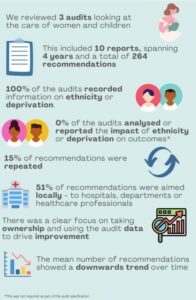 This report from HQIP (out Oct 2021) aims to identify cross-cutting lessons relating to early years healthcare, with a focus on health inequalities and variation in care. Over 250 recommendations from ten reports were reviewed and, in turn, a number of over-arching recommendations were made, including:
This report from HQIP (out Oct 2021) aims to identify cross-cutting lessons relating to early years healthcare, with a focus on health inequalities and variation in care. Over 250 recommendations from ten reports were reviewed and, in turn, a number of over-arching recommendations were made, including:


